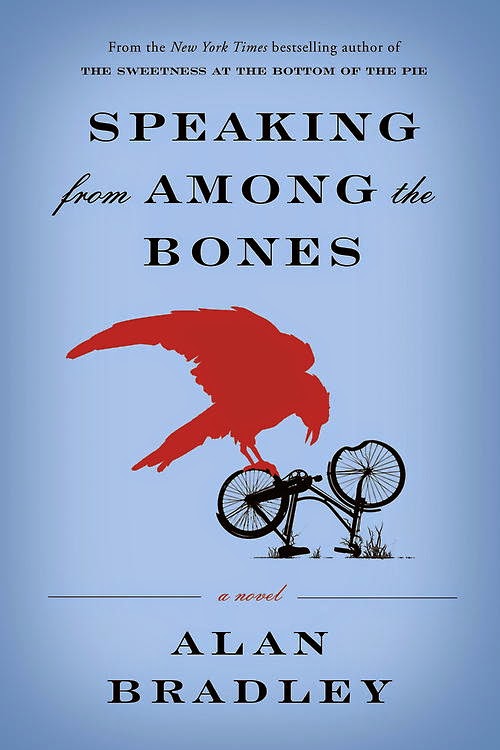Source of book: I own this.
Alan Bradley’s Flavia de Luce books need to be read in
order, or they make no sense. They are intended to be, in addition to murder
mysteries, a story of the de Luce family, and later books assume you know the
details from the earlier ones. Conveniently, I started reading the series
shortly after starting this blog, so you can read them in order and then read
my thoughts on each book. Here they are in order:
The Grave’s a Fine and Private Place is therefore the
ninth installment. After the original, Bradley contracted to write a total of
seven, then extended it to ten. I have no seen any further news, so the next
might well be the last. And, after all, Bradley is age 81, having taken up
novel writing in his retirement.
This book picks up soon after the end of the last one.
Flavia is now officially an orphan, after the death of her father. (Her mother
died shortly after her birth.) Along with her older sisters, Ophelia and
Daphne, she is on a vacation planned by her family’s faithful servant Dogger.
Rather than her hometown of Bishop’s Lacey, Flavia gets to solve a mystery in a
different (although somewhat similar) small post-war British village. Well,
four murders, actually.
While enjoying a pleasant fishing excursion, Flavia manages
to catch a body - a young actor named Orlando. It turns out he is the son of
the late vicar - who was hanged for the murder of three gossipy women who were
snidely referred to as the “three graces.”
There are plenty of possible suspects, of course. And a lot
of skeletons in the closets of more than a few people.
This being a murder mystery, I won’t go any further than
that.
I wouldn’t mind mentioning a few details, however. As in the
other books, Bradley’s love for literature and music are apparent. A minor
character complains about Daphne, saying that you can’t trust a person who
reads Trollope. I obviously disagree with this
assessment - and I suspect Bradley does too, since he manages
to get a mention of this underrated Victorian author into most of the
books.
Another fitting book reference comes from Dogger, quoting
Milton’s Areopagitica.
“A good book is the precious lifeblood of a master spirit,
embalmed and treasured up on purpose to a life beyond life.”
The musical selections are always interesting too: not too
obscure, but not exactly mainstream either. Rather, they are the sort of works
that Classical buffs know and love, and that might be passingly familiar to
everyone else.
In this case, Bradley uses Bach’s The Art of the Fugue.
Clocking in at about an hour and fifteen minutes, it serves to give Flavia a
window of time to do some sleuthing.
While these books aren’t exactly high literature, Bradley
does write well. I find them a cut about typical genre fiction.
I should mention a couple of witty lines I liked. This one
is courtesy of Mrs. Dandyman, the proprietor of the circus, allegedly quoting
the late vicar.
“There’s nothing so deadly as an acid tongue driven by a
pious mind.”
True that.
And finally, a line from Flavia herself, who makes an
educated assumption, and wins a gasp from the new vicar.
“How could you possibly know that?”
“Feminine intuition,” I replied. Which was an outright
lie. Feminine intuition is no more than an acceptable excuse for female
brains.”
Very true indeed. It can’t be that women are as smart (and
often smarter) than men, right? It has to be some mysterious “intuition” they
are born with, rather than that. And Flavia is both smart and observant, two
traits which are necessary to make a good sleuth.
I had fun with this light, quick read. But definitely start
at the beginning.
***
How about a bit of Bach?





